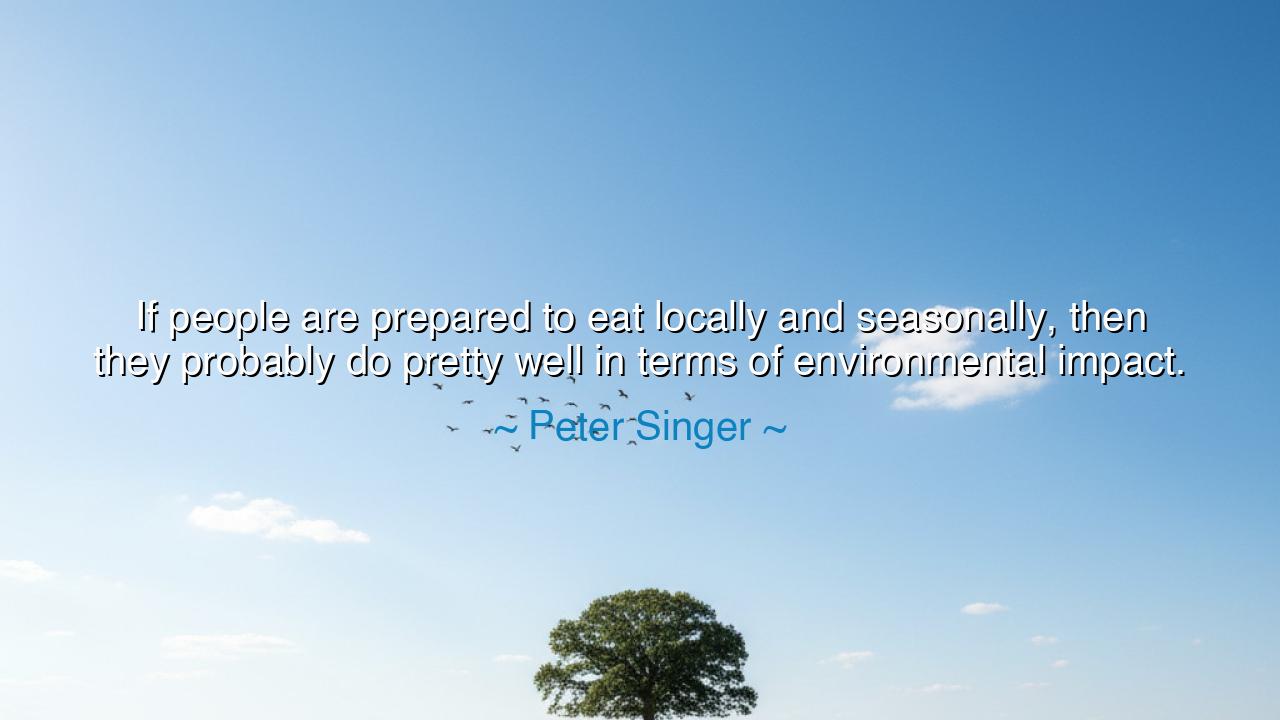
If people are prepared to eat locally and seasonally, then they
If people are prepared to eat locally and seasonally, then they probably do pretty well in terms of environmental impact.






Hear the words of Peter Singer, philosopher of ethics and advocate for compassion, who declared: “If people are prepared to eat locally and seasonally, then they probably do pretty well in terms of environmental impact.” These words are both simple and profound. They are a reminder that the choices of the table are not mere matters of taste, but acts of moral weight, shaping not only the body of the eater but the fate of the earth itself.
For what is it to eat locally? It is to take sustenance from the fields, orchards, and waters nearest to you, rather than demanding that ships and planes bring fruit from distant lands or meat from across oceans. And what is it to eat seasonally? It is to honor the rhythm of the earth itself: the strawberry in summer, the apple in autumn, the root vegetable in winter, the greens of spring. This way of eating is not new; it is the ancient way, the way our ancestors lived for millennia. Singer reminds us that to return to it is not deprivation, but restoration.
The reason is clear: when we eat food carried from afar, we burn fuel and release smoke into the sky. When we force foods to grow out of season, we drain the soil, consume unnatural energy, and demand chemicals that poison the land. But when we eat what the earth gives in its time, and from places close to our home, we live in harmony with nature’s cycle, and our environmental impact is light. Thus, the humble act of choosing a meal becomes an offering of respect to creation itself.
Consider the story of Japan’s traditional diet, rooted in rice, fish, and vegetables that grew in season. For centuries, this practice sustained both people and land with balance, producing health and longevity. But in recent decades, as global trade brought foreign meats and processed foods in abundance, both health and environment suffered—obesity grew, waters were polluted, and farming traditions weakened. Here is the lesson: when a people stray too far from local and seasonal ways, the harmony of body and earth alike is broken.
Or think of the Victory Gardens of World War II. In that time of scarcity, millions in America and Europe turned back to their own soil, planting vegetables according to season. Families ate what they grew, and in doing so they reduced demand on industry and transportation, saving fuel for the war effort. Their small acts, multiplied across millions of homes, became a force of resilience. This is proof that collective action, rooted in humble, local choices, can shape the destiny of nations.
The wisdom of Singer’s words is that morality begins with daily acts. Not every person can pass great laws or halt the engines of industry. But each person can choose what to place on their plate. Each choice is a vote: for harmony or for destruction, for restraint or for excess, for stewardship or for exploitation. Though one meal may seem small, a lifetime of meals, multiplied by millions, shifts the tides of the earth itself.
Therefore, O listener, embrace this path. Buy from local farmers when you can. Learn again the taste of seasons, rather than demanding endless summer or perpetual harvest. Waste not what the earth provides. Teach your children that food is not merely consumption but communion—with soil, with sky, with generations past and generations to come.
So let the words of Peter Singer endure in your heart: that eating locally and seasonally is no mere trend, but a moral discipline, a way of living lightly upon the earth. In doing so, you honor the cycles of creation, lessen your burden upon the planet, and find a deeper joy in simplicity. For the feast that follows the rhythm of nature is not only good for the body, but righteous for the soul.






AAdministratorAdministrator
Welcome, honored guests. Please leave a comment, we will respond soon